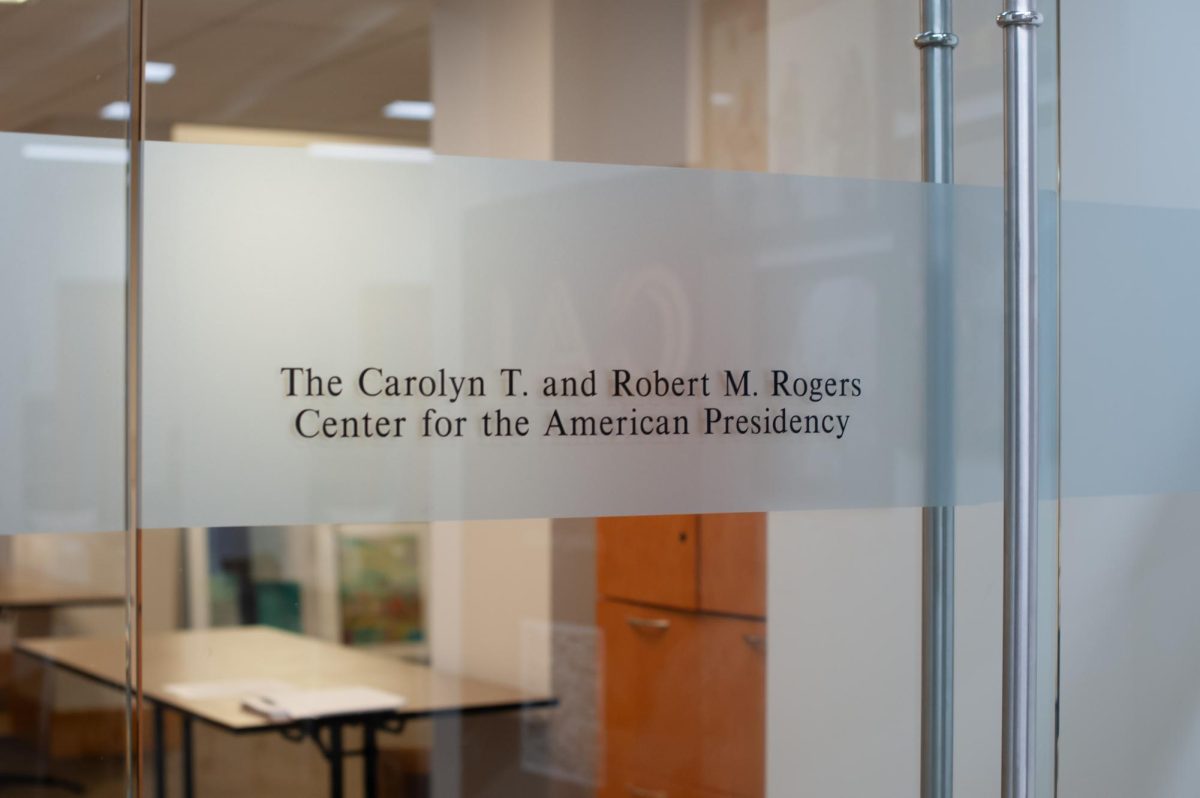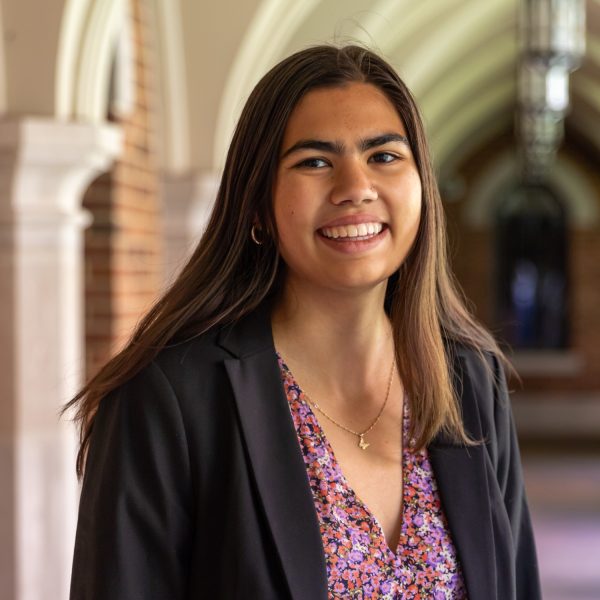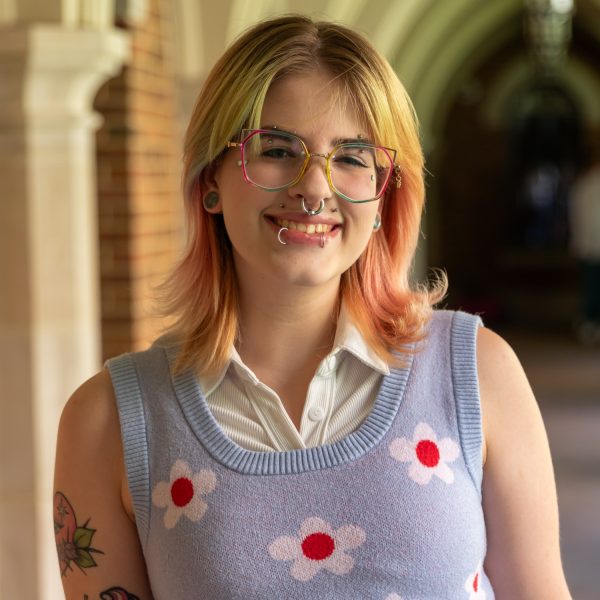Nearly three years after its establishment, the new Vanderbilt Rogers Center for the American Presidency officially launched its first speaker series this February. Journalist and historian Samuel Freedman spoke on his new early biography of Hubert Humphrey and his alliance with former Fisk University president Charles S. Johnson at the most recent event.
The Rogers Center, which previously welcomed former U.S. Rep. Liz Cheney earlier this month, aims to facilitate thoughtful dialogue on understanding the presidency. Nicole Hemmer, director of the Rogers Center and associate professor of history, said she is excited about the expansive, inclusive approach through which the Center will be studying the presidency.
“Among historians, presidential history can feel a little traditional. What the Center shows is that the new presidential history has an enormous amount to contribute to our understanding of law, activism, race, gender, power — a thoughtful and capacious approach to studying the presidency can advance our understanding of all these things, and I’m excited for the Center to be part of that project,” Hemmer said.
The Center was established in 2021 with a $5 million gift from Carolyn and Robert Rogers as part of Vanderbilt’s Dare to Grow Campaign. The funds will be used for events, research and conferences, and graduate and undergraduate students will soon be able to apply for research and travel grants. The Rogers Center is also helping to support the American Political History Conference, which will be coming to Vanderbilt for the first time later this year, bringing a few hundred political historians from around the country to present cutting-edge research on campus.
Sophomore Ochuwa Garuba, a student advisor for the Vanderbilt Project on Unity and American Democracy, has taken a class on American presidency with political science professor Sharece Thrower, a faculty affiliate for the center, and is currently enrolled in a course with Hemmer.
“Both of these classes have opened my eyes to the importance of viewing the presidency as more of a full-blown apparatus rather than just one singular person,” Garuba said. “I’m looking forward to seeing how the Rogers Center will use its platform to elevate some of the unsung heroes, especially those belonging to underrepresented groups, who make the executive branch run on a day-to-day basis.”
On March 28, the Rogers Center will continue its speaker series with Rebecca Traister, a leading writer on women and politics, who will discuss the role of abortion and reproductive health in the upcoming presidential election.
Samuel Freedman on Hubert Humphrey
The Center received Freedman on Feb. 20 to speak about “Into the Bright Sunshine,” his new early biography on former vice president and civil rights advocate Hubert Humphrey, whose activism was shaped by the work of Fisk University president Charles Johnson.
“That local connection allowed us to talk about the way an important Nashville institution helped remake the Democratic Party as well as inspire a man who would one day run for president,” Hemmer said.
Facilitated by history professor Dennis Dickerson, who is currently co-writing a book on Nashville and the civil rights movement, Freedman first discussed some of the moments in Humphrey’s early life as Minnesota mayor and senator that led him to activism.
“I think there weren’t a lot of liberal Democrats who were ready to take on [Franklin D.] Roosevelt because they felt that overall, they were willing to unfortunately morally pay the price in tolerating Jim Crow in order to get the rest of the social impact activism,” Freedman said. “But Humphrey clearly saw the contradiction within that for what it was on the way to 1948 in his political life in Minneapolis.”
According to Dickerson, one of the climaxes of Humphrey’s life was his speech at the 1948 Democratic National Convention, where he successfully advocated for a proposal to end racial segregation. Freedman framed the success as the fruition of alliance-building during his political ventures in Minnesota, as well as of research and lessons learned from Johnson.
“When Johnson was the head and the intellectual leader at the Race Relations Institute, he was tapped by Hubert Humphrey to come to Minneapolis to conduct the self survey [on racial tensions],” Dickerson said. “He really highlighted the way in which African American scholars played a large role in partnership with politicians and [informed] other government policies.”
Freedman mentioned that Johnson would often be brought in after a period of deep racial violence, like the Chicago Race Riot and Red Summer of 1919, but Humphrey, as Minnesota mayor, was proactive in calling in Johnson prior to incidents of violence.
“[Johnson] developed a database, a database that showed how entrenched bigotry was against Jews, Blacks, Indigenous people, and it showed how pervasive these prejudices were across all aspects of Minneapolis society, religious sector, recreation sector, education sector, labor union, etc.,” Freedman said.
Dickerson and Freedman went on to discuss the hypocrisy of former President Harry Truman, who rode on a surge of Black voters to win re-election in 1948, but did not pursue civil rights legislation until advocates like Humphrey called him out.
During the question and answer session, one participant asked Freedman why his book on Humphrey matters today, and Freedman, who said his initial goal was to bridge the gaps in Humphrey’s early life, pointed to recent events that have brought his legacy to the forefront.
“Until Donald Trump was elected, I felt that I was very happy filling in these holes in the historical biographical record. And then with his election, the upsurge in right-wing extremism, George Floyd’s murder and the BLM Movement nationally, I felt like no, I’m actually writing current events here,” Freedman said.
Hemmer commented on how the talk showed the forces of the presidency are not just within the office itself, but the local citizens who shape it.
“What I loved about this event is that it allowed us to show how capacious the study of the president can be,” Hemmer said. “It’s not just the men who have held the office and the people who worked for them, but also includes the stories of Black activists, rural organizers, and local reformers who might never set foot in the White House.”














